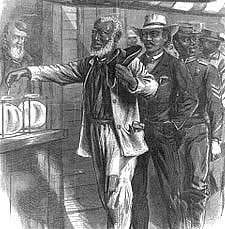 When the Civil War came to an end, it was important to take the big accomplishments and transition them into the law of the land before any ground was lost as reconstruction returned the nation to one country rather than two warring parties. The upheaval of society that the abolition of slavery represented and the massive surge forward for black history was so important that it was important to make it permanent with amendments to the constitution so the gains made during that bloody battle would not be lost again. The work that needed to be done to change a nation from one of slavery to one of equality started with three important amendments to the constitution. The thirteenth amendment abolished slavery forever and the fourteenth amendment reversed the negative effects of the Dred Scott decision providing equal protection under the law for all citizens of this country regardless of race, color or creed.
When the Civil War came to an end, it was important to take the big accomplishments and transition them into the law of the land before any ground was lost as reconstruction returned the nation to one country rather than two warring parties. The upheaval of society that the abolition of slavery represented and the massive surge forward for black history was so important that it was important to make it permanent with amendments to the constitution so the gains made during that bloody battle would not be lost again. The work that needed to be done to change a nation from one of slavery to one of equality started with three important amendments to the constitution. The thirteenth amendment abolished slavery forever and the fourteenth amendment reversed the negative effects of the Dred Scott decision providing equal protection under the law for all citizens of this country regardless of race, color or creed.
But the fifteenth amendment went further than just establishing the basic human rights of the African American community. It made a change so fundamental to how America works that its ramifications were sweeping and far reaching down to this day. The text of the amendment is direct and elegant.
The right of citizens of the United States to vote shall not be denied or abridged by the United States or by any State on account of race, color, or previous condition of servitude.
This was a tremendous leap forward for the black community when this amendment was ratified on February 3, 1870, because it finally meant that the African American population in this country could stand up and be counted and start making a mark on politics and with it how decisions are made in this country.
But like so many other great advances in black history, earning the right to vote didn’t automatically make it easy to vote. There was staunch resistance to actually allowing blacks to go to the polling booth in many communities across the country. The Klu Klux Klan engaged in intimidation tactics to try to keep African Americans home from the polls. In Louisiana, the mob attempts to stop the institutions of a legally elected and integrated local governments had to be broken up by federal troops sent in by Ulysses S. Grant.
Probably the most serious threat to the actual workability of the fifteenth amendment was the introduction of the poll tax and other registration tricks that were used such as literacy tests and voter qualification tests clearly designed to deny the right to vote to African Americans. This practice became such a problem that it instigated the passage of the twenty fourth amendment which outlawed poll taxes which were only designed to usurp the rights of African Americans to vote. Has history repeated itself???
Over the past two years, more than 30 states have introduced legislation or enacted laws that would curb voter’s access to voting. Some states, such as the battleground states of Florida and Ohio have dramatically shortened early voting opportunities, including the weekend before Election Day when many minority voters choose to vote. Florida and Texas both passed legislation to make it harder for volunteer organizations like the League of Women Voters to register voters. Since 2011, ten states have joined Indiana and Georgia to require voters to show a photo ID to vote. Several others are considering photo ID legislation. Additionally, some states including Kansas, are requiring citizens show proof of citizenship to register to vote.
CHECK OUT OUR BRAND NEW BOWLING SUPPLIES SITE – CLICK HERE
This post is genuinely a pleasant one it assists new net visitors, who are wishing for blogging.